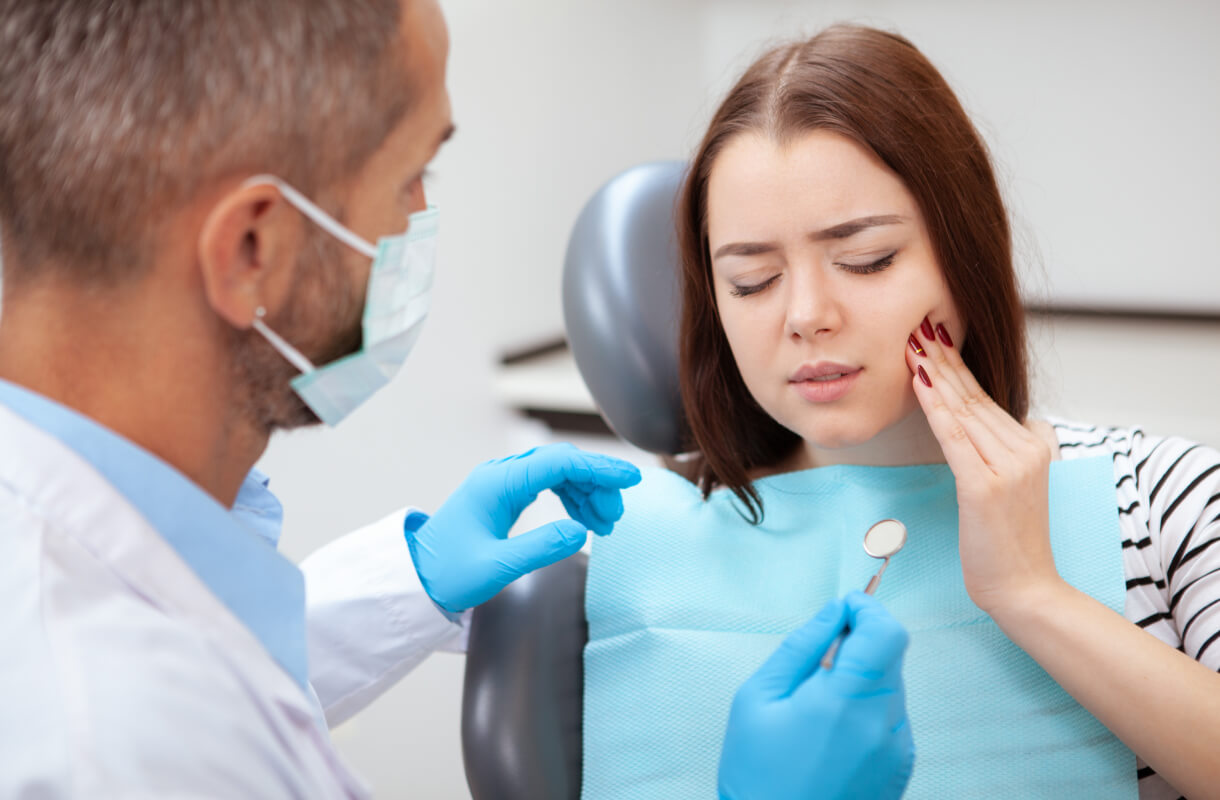Is Your Tooth Infected?
Dental abscesses are painful infections that can lead to serious complications if not treated promptly. They require immediate attention from a dental professional to prevent the spread of infection and to alleviate pain.
Dr. G is one of the best dentists in Wylie and can help treat a tooth abscess. Contact our dental office today at (214) 702-0446.

What Are Dental Abscesses?
A dental abscess, or a tooth abscess, is a painful condition that occurs when a bacterial infection leads to the formation of a pus-filled pocket within the tooth or surrounding tissues. When faced with a dental abscess, it’s essential to seek prompt dental care to prevent the infection from spreading and causing further complications.
Types of Dental Abscesses
- Periapical Abscess: This type of abscess forms at the tip of the tooth’s root. It’s often caused by bacteria entering the pulp chamber of the tooth, usually as a result of an untreated dental cavity, a cracked tooth, or previous dental work.
- Periodontal Abscess: This type forms in the gums at the side of a tooth root. It’s often the result of an infection that has spread from the periodontal pocket, the space between the gum and the tooth, to the surrounding tissues.
- Gingival Abscess: This occurs only in the gum tissue, without affecting the tooth or the periodontal ligament. It often results from injury to the gums, such as from foreign bodies like popcorn kernels, or an improperly fitted dental appliance.

What Causes Dental Abscesses?
Dental abscesses are primarily caused by bacterial infections. This bacterial infection can result from various factors, including:
- Tooth Decay: Deep cavities can allow bacteria to reach the inner pulp of the tooth.
- Gum Disease: Severe periodontal disease can lead to abscesses in the gums.
- Trauma: Cracked or chipped teeth can provide an entry point for bacteria.
- Poor Dental Hygiene: Inadequate brushing and flossing can lead to the buildup of plaque and tartar, fostering bacterial growth.
- Previous Dental Work: Sometimes, dental procedures can inadvertently introduce bacteria.
Tooth Abscess Symptoms
Recognizing the signs of a tooth abscess is crucial to seeking timely treatment. Some common symptoms include:
- Severe Toothache: Persistent, throbbing pain that can radiate to the jaw, neck, or ear.
- Sensitivity: Increased sensitivity to hot and cold temperatures.
- Swelling: Swelling in the face, neck, or cheek.
- Red, Swollen Gums: Gums may be red, swollen, and tender to touch.
- Foul Taste or Smell: A bad taste or smell in the mouth due to pus drainage.
- Fever: A high temperature indicating infection.
- Difficulty Swallowing or Breathing: In severe cases, swelling can obstruct the airway.
If you’re experiencing any of the symptoms mentioned above, contact our Wylie emergency dentist as soon as possible so we can treat the affected tooth.
Emergency Dental Care for an Abscessed Tooth
When facing a dental abscess, it’s essential to seek immediate dental care to alleviate pain and prevent complications. Here’s what you can expect during emergency dental treatment:
- Drainage of the Abscess: Our dentist may make a small incision to allow the pus to drain, providing relief from pain and pressure.
- Root Canal Treatment: In cases where the abscess has affected the tooth’s pulp, a root canal procedure may be necessary to remove the infected tissue.
- Prescription Antibiotics: To control the infection and prevent its spread, your dentist may prescribe antibiotics.
- Pain Management: Over-the-counter pain relievers or prescription medications may be recommended to manage pain and inflammation.
- Follow-Up Care: After the initial treatment, follow-up visits are crucial to ensure proper healing and address any concerns.
Preventing Dental Abscesses
To reduce the risk of dental abscesses, follow these preventive strategies:
- Maintain Good Oral Hygiene: Brush your teeth twice daily and floss regularly to remove plaque and bacteria.
- Attend Regular Dental Check-ups: Routine dental visits allow early detection and prompt treatment of dental issues.
- Address Dental Problems Promptly: Don’t ignore dental problems such as cavities or gum disease. Seek timely treatment to prevent complications.
- Avoid Harmful Habits: Refrain from smoking and excessive alcohol consumption, as they can contribute to dental problems.
- Use Fluoridated Toothpaste: Fluoride helps strengthen enamel and protects against tooth decay.

Frequently Asked Questions
A dental infection can become an emergency when it poses a severe risk to your overall health or if it causes intense pain and swelling. Some situations that may indicate a dental emergency include:
- Severe and persistent toothache
- Swelling of the face or gums
- Difficulty breathing or swallowing
- High fever
- Pus discharge from the affected area
- Rapidly spreading infection
Yes, in cases of severe dental infections, the emergency room (ER) can provide initial care and pain relief. Doctors may prescribe antibiotics to help control infection and alleviate symptoms temporarily. However, ERs can’t handle definitive dental treatments like root canal therapy or extractions.
The timeline for developing sepsis from a tooth infection can vary depending on various factors, such as the individual’s overall health, the severity of the infection, and how quickly the infection spreads. In some cases, a dental infection can lead to sepsis within a few days if left untreated and if the bacteria enter the bloodstream.
No, a dental abscess will not go away on its own. It requires professional treatment to remove the infection and prevent complications.
Protect Your Teeth From Emergency-Inducing Infections
By recognizing the symptoms and understanding the importance of seeking immediate dental care when suffering from a tooth abscess, you can prevent complications and ensure a swift recovery. Remember, a dental infection can escalate into a critical condition if left untreated, leading to severe pain, facial swelling, and potential risks of sepsis.
Call our Wylie dental office at (214) 702-0446 to schedule your consultation and keep your oral health on track. Dr. G is here for your dental emergencies.